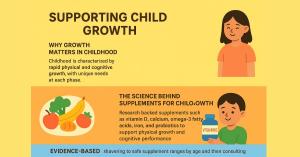LogsDay’s new guide highlights safe, science-backed supplements to support child growth, immunity, brain health, and overall development
PUNE, MAHARASHTRA, INDIA, September 14, 2025 /EINPresswire.com/ -- A newly published guide on LogsDay, “𝐒𝐜𝐢𝐞𝐧𝐜𝐞-𝐁𝐚𝐜𝐤𝐞𝐝 𝐒𝐮𝐩𝐩𝐥𝐞𝐦𝐞𝐧𝐭𝐬 𝐭𝐨 𝐒𝐮𝐩𝐩𝐨𝐫𝐭 𝐂𝐡𝐢𝐥𝐝 𝐆𝐫𝐨𝐰𝐭𝐡,” highlights how parents can use evidence-based nutrients and supplements to help children reach healthy growth milestones. The guide focuses on essential daily nutrients, safe dosage guidance, and detailed advice from pediatric experts to support strong bones, cognitive development, immunity, and overall child health.
𝐖𝐡𝐲 𝐆𝐫𝐨𝐰𝐭𝐡 𝐌𝐚𝐭𝐭𝐞𝐫𝐬
Child growth is not just about height. It includes the development of strong bones, good
brain function, energy levels, immunity, and emotional well-being. While a balanced diet, good sleep, and regular physical activity are the foundation, many children still lack enough essential nutrients because of picky eating habits, limited food variety, or busy lifestyles. Simple steps like encouraging 𝐩𝐫𝐨𝐭𝐞𝐢𝐧-𝐩𝐚𝐜𝐤𝐞𝐝 𝐦𝐨𝐫𝐧𝐢𝐧𝐠𝐬 can also make a big difference. For many families, science-backed supplements for child growth can help bridge nutrition gaps.𝐄𝐬𝐬𝐞𝐧𝐭𝐢𝐚𝐥 𝐍𝐮𝐭𝐫𝐢𝐞𝐧𝐭𝐬 & 𝐒𝐮𝐩𝐩𝐥𝐞𝐦𝐞𝐧𝐭𝐬 𝐟𝐨𝐫 𝐂𝐡𝐢𝐥𝐝 𝐆𝐫𝐨𝐰𝐭𝐡
The guide identifies key nutrients supported by scientific research that are often missing in children’s diets:
• Calcium & Vitamin D for bone health and development. Without enough vitamin D, the body cannot absorb calcium properly.
• Zinc for immune strength and cellular growth. Zinc deficiency is linked to slower physical growth and frequent illness.
• Protein for muscle and tissue development. Protein helps with weight gain, healing, and keeping children active.
• Iron & B Vitamins (especially B12 and folate) for energy and cognitive growth. Low iron can result in fatigue, trouble focusing, or anemia.
• Omega-3 fatty acids and probiotics, mentioned as having good effects on brain development, learning, behavior, gut health, and immunity when used appropriately.
𝐒𝐚𝐟𝐞 𝐃𝐨𝐬𝐚𝐠𝐞 𝐚𝐧𝐝 𝐑𝐢𝐬𝐤𝐬 𝐨𝐟 𝐎𝐯𝐞𝐫-𝐒𝐮𝐩𝐩𝐥𝐞𝐦𝐞𝐧𝐭𝐚𝐭𝐢𝐨𝐧
𝐋𝐨𝐠𝐬𝐃𝐚𝐲 emphasizes that supplements are not substitutes for a healthy diet. Using supplements without guidance can lead to over-intake, which may cause negative health effects. Safe supplement ranges vary by age. For example, toddlers need lower doses of vitamin D, calcium, and iron than adolescents. Excess vitamin D can cause nausea or kidney issues; too much iron can stress the liver or upset digestion.
𝐖𝐡𝐞𝐧 𝐒𝐮𝐩𝐩𝐥𝐞𝐦𝐞𝐧𝐭𝐬 𝐌𝐚𝐲 𝐍𝐨𝐭 𝐁𝐞 𝐍𝐞𝐞𝐝𝐞𝐝
Many children get adequate nutrition from well-balanced meals that include whole grains, proteins, fruits, vegetables, and healthy fats. If a child eats a variety of foods, shows steady growth, has good energy, strong bone health, and fewer illnesses, supplements may not be necessary. Look for signs like healthy skin, regular growth in height and weight, good concentration, and active play.
𝐄𝐱𝐩𝐞𝐫𝐭 𝐀𝐝𝐯𝐢𝐜𝐞 𝐁𝐞𝐟𝐨𝐫𝐞 𝐒𝐮𝐩𝐩𝐥𝐞𝐦𝐞𝐧𝐭𝐢𝐧𝐠
“Every child’s growth journey is unique,” says Dr. Meera Singh, Pediatric Endocrinologist at Pune Children’s Hospital. “Supplements for child growth can be beneficial when there are nutrient gaps, but only after medical evaluation, growth checks, and possibly lab tests. Over-supplementation can be more harmful than helpful.”
According to Dr. Rajesh Patel, Nutrition Scientist at the Indian Institute of Health Sciences, “Essential nutrients such as vitamin D, calcium, zinc, iron, omega-3s, and B vitamins are well backed by research. When parents use science-backed supplements under pediatric guidance, children are more likely to achieve better bone strength, immune function, and cognitive development.”
Parents are advised to consult a pediatrician before beginning any supplement routine. Growth checks, lab tests (e.g. for vitamin D, iron, B12), and a review of the child’s diet history help to make decisions that are safe and effective.
𝐖𝐡𝐨 𝐖𝐢𝐥𝐥 𝐁𝐞𝐧𝐞𝐟𝐢𝐭
The guide is designed for parents, caregivers, and healthcare professionals seeking clear, research-backed advice on child nutrition. It is especially helpful for:
• Parents of picky eaters who worry their children are not getting enough essential nutrients.
• Families with children on vegetarian or vegan diets, where vitamin B12, iron, or omega-3s may be limited.
• Children with frequent illnesses or weak immunity, who may benefit from supplements like zinc, vitamin D, or probiotics.
• Athletically active children, who need additional protein and balanced nutrition for energy and muscle growth.
• Pediatricians, nutritionists, and educators, who want a simple resource to guide families toward safe supplement practices.
By addressing these groups, the guide helps ensure the right children benefit while preventing unnecessary supplementation.
𝐊𝐞𝐲 𝐓𝐚𝐤𝐞𝐚𝐰𝐚𝐲𝐬
• Nutrition comes first. Healthy meals with proteins, fruits, vegetables, and healthy fats should be the base of any growth strategy.
• Supplements for child growth are useful when there are clear nutrient gaps, but not a replacement for wholesome meals.
• Essential nutrients such as calcium, vitamin D, zinc, iron, protein, omega-3s, and B vitamins are supported by scientific studies in promoting bone health, immune strength, brain development, energy, and overall growth.
• Safe dosage by age is very important; too much of certain supplements can be harmful.
• Always get expert advice—pediatrician consultation, lab tests, and growth evaluations should guide supplement use.
𝐀𝐛𝐨𝐮𝐭 𝐋𝐨𝐠𝐬𝐃𝐚𝐲
LogsDay is a lifestyle website dedicated to bringing readers reliable, research-based content on health, personal development, and well-being. The guide Science-Backed Supplements to Support Child Growth reflects the site’s commitment to helping parents and caregivers make informed decisions about child nutrition and long-term health.

No comments:
Post a Comment